-
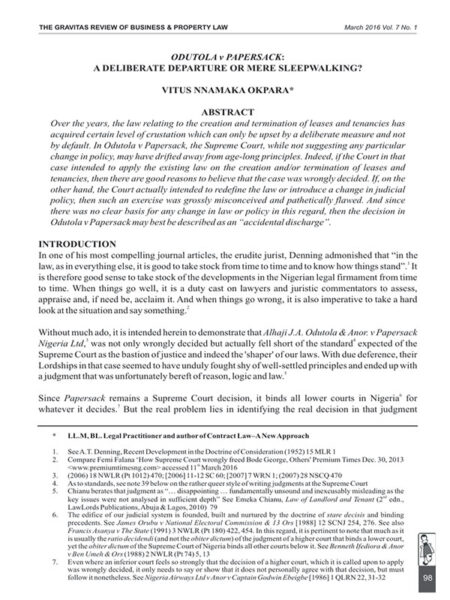
Odutola v Papersack: A Deliberate Departure or mere Sleepwalking?
0₦2,500.00Vitus Okpara, legal practitioner and author of Contract Law–A New Approach, continues the discussion on termination of tenancies in his article “Odutola v Papersack: A Deliberate Departure or Mere Sleepwalking?” In this compelling review, Okpara asks whether the Supreme Court intended to depart from a long line of its previous decisions on creation and termination of tenancies or the decision in Papersack was an “accidental discharge”.
-
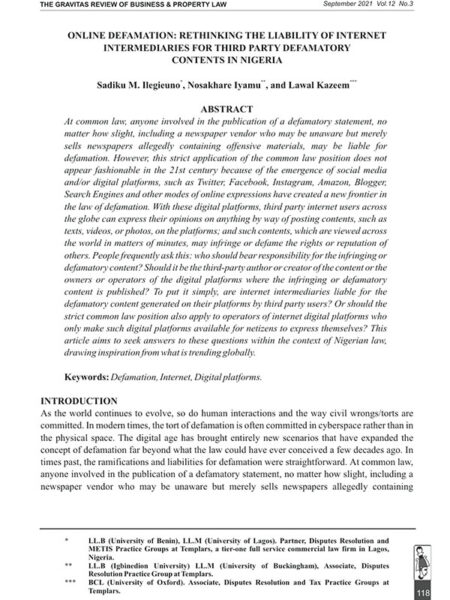
Online Defamation: Rethinking the Liability of Internet Intermediaries for Third-Party Defamatory Contents in Nigeria
0₦2,500.00Sadiku Ilegieuno, Nosakhare Iyamu, and Lawal Kazeem, Partner and Associates respectively at Templars, in their article, Online Defamation: Rethinking the Liability of Internet Intermediaries for Third-Party Defamatory Contents in Nigeria, note that the emergence of digital media has created a whole new category to the original definition of defamation, and the strict definition of the tort at common law has been rendered otiose in application to new media. Sadiku et al examine who bears the liability for defamatory content since several parties are often involved in the publication. Should it be the third-party author or creator of the content or the owners or operators of the digital platforms where the infringing or defamatory content is published? In other words, are internet intermediaries liable for the defamatory content generated on their platforms by third party users? They examine these questions within the context of the common law, the extant laws in Nigeria, and what is obtainable across the globe.
-
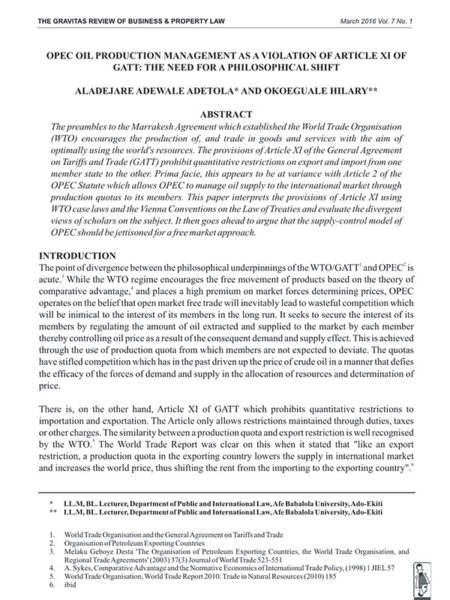
OPEC Oil Production Management as a Violation of Article XI of GATT: The Need for a Philosophical Shift
0₦2,500.00Aladejare Adetola and Okoeguale Hilary of the Department of Public and International Law, Afe Babalola University, Ado-Ekiti in their article “OPEC Oil Production Management as a violation of Article XI of GATT: The Need for a Philosophical Shift” analyses contending positions on whether OPEC oil production quota violates Article XI of the General Agreement on Tariffs and Trade (GATT) which prohibits quantitative restrictions on export and import from one member state to the other. Interestingly, the decisive element in the controversy may be whether oil is a “good” or “product”.
-
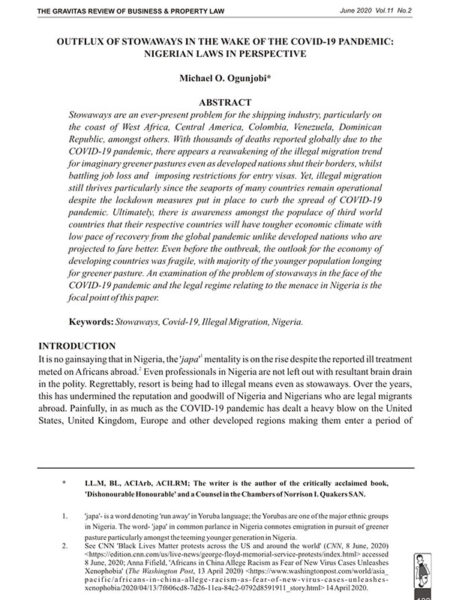
Outflux of Stowaways in the Wake of the Covid-19 Pandemic: Nigerian Laws in Perspective
0₦2,500.00Michael Ogunjobi, Counsel in the Chambers of Norrison I. Quakers SAN, in his article, Outflux of Stowaways in the Wake of the Covid-19 Pandemic: Nigerian Laws in Perspective, observes that the issue of stowaways is a major headache for the shipping industry. Against the background of the coronavirus pandemic, Ogunjobi comprehensively reviews Nigerian laws, regulations and international instruments on seaport entry and exit requirements, protection, sanctions and prosecution of stowaways.
-
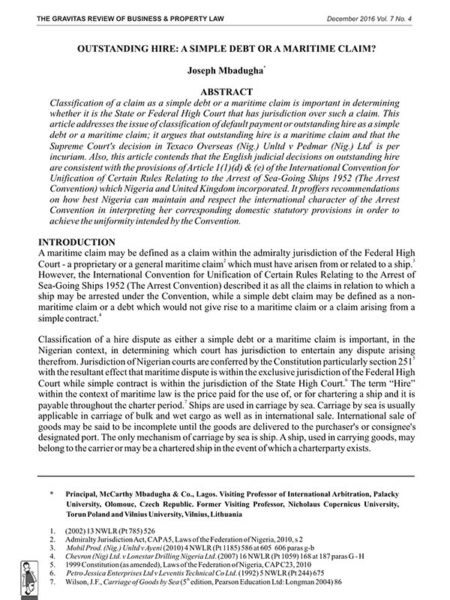
Outstanding Hire: A Simple Debt or Maritime Claim?
0₦2,500.00Joseph Mbadugha of McCarthy Mbadugha & Co and former Visiting Professor, Nicholaus Copernicus University of Torun Poland and at Vilnius University, Vilnius, Lithuania in his article “Outstanding Hire: A Simple Debt or A Maritime Claim?” examines the classification of a claim as either a simple debt or a maritime claim and its implication on whether it is the State or Federal High Court that has jurisdiction over such a claim. He argues that despite the domestication of Article 1(1)(d) & (e) of the International Convention for Unification of Certain Rules Relating to the Arrest of Sea-Going Ships 1952 (The Arrest Convention) in Section 2(3)(f) of the Nigerian Admiralty Jurisdiction Act 1991 (AJA) an in 20(2)(h) of the English Supreme Court 1981, only the English Courts have stayed true to the spirit of the Convention. He argues that the Supreme Court decision in Texaco Overseas (Nig.) Unltd v Pedmar (Nig.) Ltd in blurring the distinction between a Charterparty and a Bill of Lading Contract, was reached per incuriam.
-
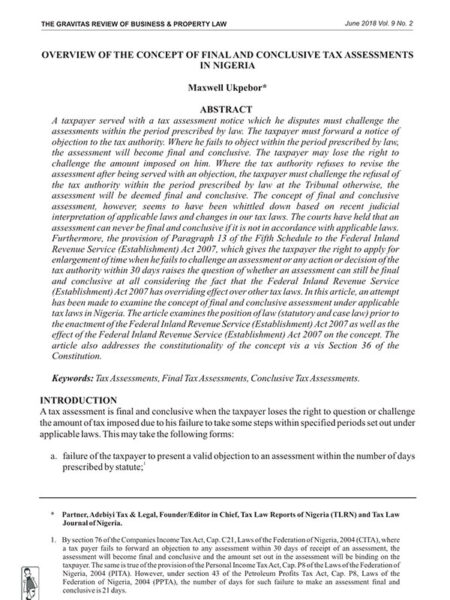
Overview of the Concept of Final and Conclusive Tax Assessments in Nigeria
0₦2,500.00Maxwell Ukpebor, Partner, Adebiyi Tax & Legal, and Editor-in-Chief of Tax Law Reports of Nigeria in his paper, Overview of the Concept of Final and Conclusive Tax Assessments, notes that a taxpayer served with a tax assessment which he disputes must challenge the assessment within the period prescribed by law otherwise the assessment becomes final and conclusive. He examines the constitutionality of the concept of final and conclusive tax assessment in Nigeria, the position of law (statutory and case law) prior to the enactment of the Federal Inland Revenue Service (Establishment) Act 2007, as well as the effect of the FIRS Act on the concept.
-
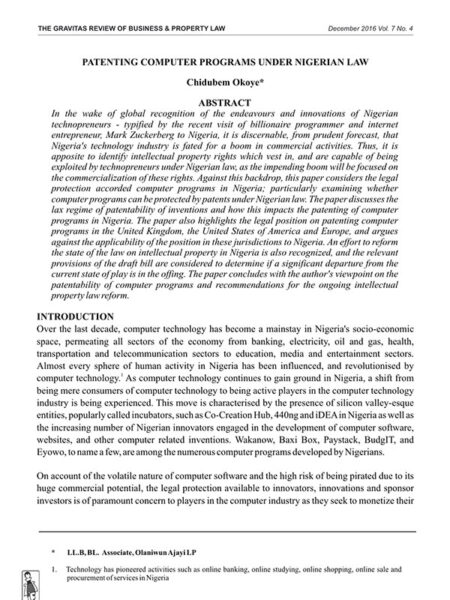
Patenting Computer Programs under Nigerian Law
0₦2,500.00In the wake of the increasing number of Nigerian innovators engaged in the development of computer software, websites and programs like Wakanow, Baxi Box, Paystack, BudgIT, and Eyowo, Chidubem Okoye, Associate at Olaniwun Ajayi LP in his article “Patenting Computer Programs Under Nigerian Law” considers the patentability of computer programs in Nigeria and the state of the law in US and Europe.
-
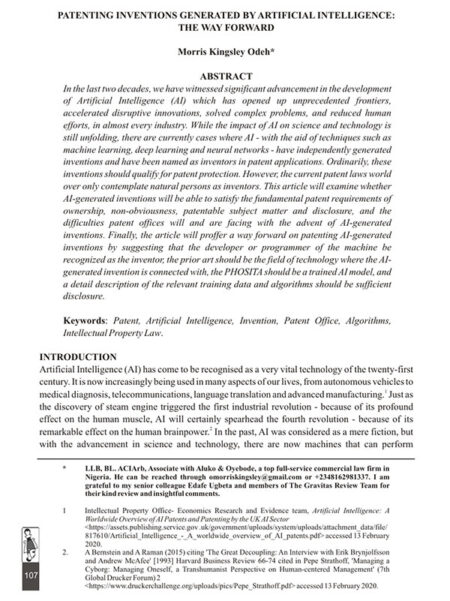
Patenting Inventions Generated by Artificial Intelligence: The Way Forward
0₦2,500.00Morris Odeh, Associate with Aluko & Oyebode in his article, Patenting Inventions Generated by Artificial Intelligence: The Way Forward, observes that the world has witnessed significant advancement in the development of Artificial Intelligence (AI) which has opened up unprecedented frontiers, accelerated disruptive innovations, solved complex problems, and reduced human efforts, in almost every industry. While the impact of AI on science and technology is still unfolding, there are currently cases where AI – with the aid of techniques such as machine learning, deep learning and neural networks-have independently generated inventions and have been named as inventors in patent applications. Ordinarily, these inventions should qualify for patent protection. However, the current patent laws only contemplate natural persons as inventors. Odeh examines whether AI-generated inventions will be able to satisfy the fundamental patent requirements of ownership, non-obviousness, patentable subject matter and disclosure, and the difficulties patent offices will and are facing with the advent of AI-generated inventions.
-
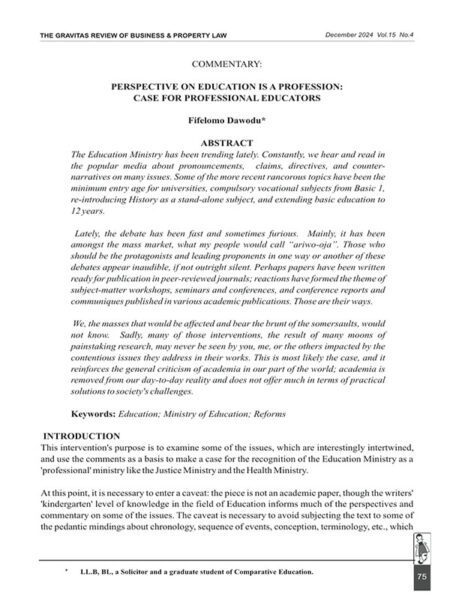
Perspective on Education as a Profession: Case for Professional Educators
0₦2,500.00Fifelomo Dawodu in her commentary, Perspective on Education as a Profession: Case for Professional Educators, takes a swipe at the various somersaults in the regulatory policies of the Ministry of Education highlighting the systemic impact on the entire educational sector. The Education Ministry has been trending lately. Constantly we hear and read in the popular media about pronouncements, claims, directives, counter-narratives on many issues. Some of the more recent rancorous topics have been minimum entry age for universities, compulsory vocational subjects from Basic 1, re-introduction of History as a stand alone subject, and extension of basic education to 12 years. The debate of late has been fast and sometimes, furious. Sadly, many of those interventions, the result of many moons of painstaking research may never be seen. This is most likely the case and it reinforces the general criticism of academia in our part of the world, that academia is removed from our day to day reality and does not offer much in terms of practical solutions to society’s challenges.
-
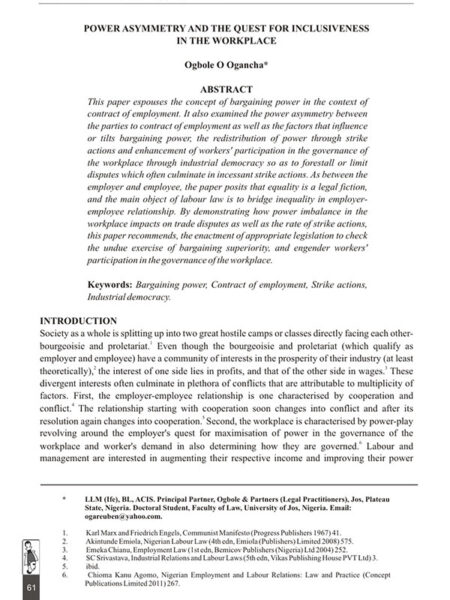
Power Asymmetry and the Quest for Inclusiveness in the Workplace
0₦2,500.00Ogbole Ogancha of Ogbole & Partners and Doctoral Candidate, Faculty of Law, University of Jos Nigeria inPower Asymmetry and the Quest for Inclusiveness in the Workplace, examines the concept of bargaining power in the context of the contract of employment. He considers the power imbalance between the parties to a contract of employment as well as the factors that influence or tilts bargaining power, the redistribution of power through strike actions and enhancement of workers’ participation in the governance of the workplace. Ogbole argues that equality in labour relations is a legal fiction, and the main object of labour law is to bridge inequality in the employer-employee relationship. Aside from demonstrating how power imbalance in the workplace impacts on trade disputes as well as the rate of strike actions, he recommends the enactment of appropriate legislation to check the undue exercise of bargaining superiority to engender workers’ participation in the governance of the workplace.
-
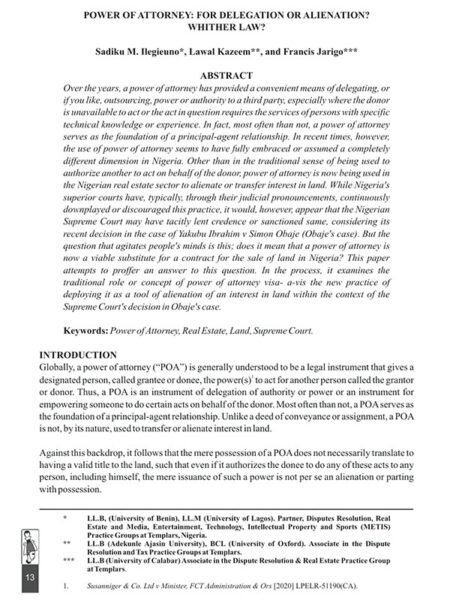
Power of Attorney: For Delegation or Alienation? Whither Law?
0₦2,500.00Sadiku Ilegieuno, Lawal Kazeem and Francis Jarigo, all of Templars, Nigeria, in their article, Power of Attorney: For Delegation or Alienation? Whither Law? note that other than using a power of attorney in the traditional sense to authorize a donee to act on behalf of a donor, power of attorney is now being used in the Nigerian real estate sector to alienate or transfer interest in land. While Nigeria’s superior courts have downplayed or discouraged this practice through their judicial pronouncements, Nigerian Supreme Court may have tacitly lent credence or sanctioned the practice, considering its recent decision in the case of Yakubu Ibrahim v Simon Obaje. Ilegieuno et al. consider whether a power of attorney is now a viable substitute for a contract for the sale of land in Nigeria. They examine the traditional role of the power of attorney vis- a-vis the new practice of deploying it as a tool of alienation of an interest in land within the context of the Supreme Court’s decision in Obaje’s case.
-
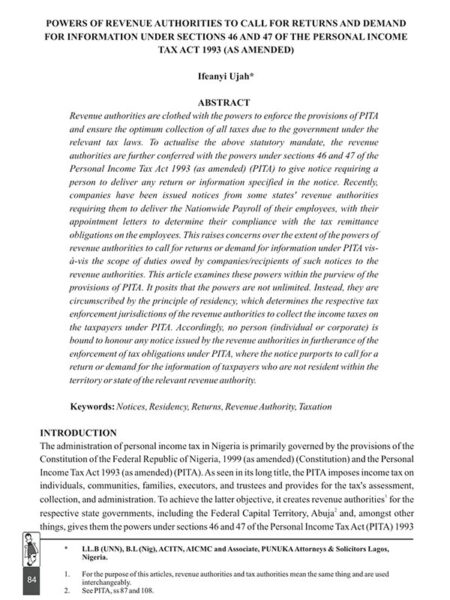
Powers of Revenue Authorities to Call for Returns and Demand for Information under Sections 46 and 47 of the Personal Income Tax Act 1993
0₦2,500.00Ifeanyi Ujah, in his article, Powers of Revenue Authorities to Call for Returns and Demand for Information under Sections 46 and 47 of the Personal Income Tax Act 1993, examines the extent and limitations on the powers of Revenue authorities to call for Returns and Demand for Information under the PITA. Revenue authorities are clothed with the powers to enforce the provisions of PITA and ensure optimum collection of all taxes due to the government under the relevant tax laws. To actualize the above statutory mandate, the revenue authorities are further conferred with the powers under sections 46 and 47 of the Personal Income Tax Act 1993 (as amended) (PITA) to give notice requiring a person to deliver any return or information specified in the notice. Recently, companies have been issued with notices from revenue authority of some states, requiring them to deliver the Nationwide Payroll of their employees, with their appointment letters for the purpose of determining their compliance with the tax remittance obligations on the employees. This raises concerns over the extent of the powers of revenue authorities to call for returns or demand for information under PITA, vis-à-vis the scope of duties owed by companies/recipients of such notices to the revenue authorities. Ujah examines these powers within the purview of the provisions of PITA. He posits that the powers are not unlimited, rather they are circumscribed by the principle of residency which determines the respective tax enforcement jurisdictions of the revenue authorities to collect the income taxes on the taxpayers under PITA. Accordingly, no person (individual or corporate) is bound to honour any notice issued by the revenue authorities in furtherance to the enforcement of tax obligations under PITA, where the notice purports to call for return or demand for the information of taxpayers who are not resident within the territory or state of the relevant revenue authority.
The Gravitas Review of Business & Property Law



